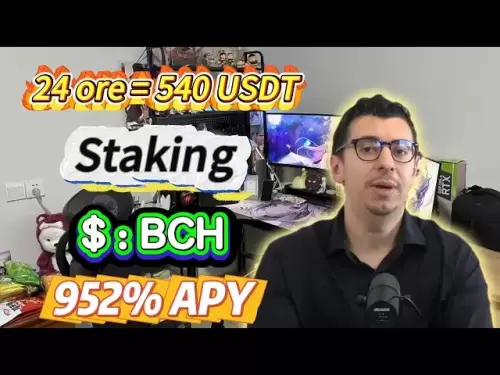-
 Bitcoin
Bitcoin $108,703.4836
0.45% -
 Ethereum
Ethereum $2,576.6839
1.58% -
 Tether USDt
Tether USDt $1.0001
0.00% -
 XRP
XRP $2.2924
-0.87% -
 BNB
BNB $660.2136
0.01% -
 Solana
Solana $151.4729
-0.29% -
 USDC
USDC $1.0000
0.00% -
 TRON
TRON $0.2866
0.04% -
 Dogecoin
Dogecoin $0.1698
0.82% -
 Cardano
Cardano $0.5831
0.13% -
 Hyperliquid
Hyperliquid $37.9814
-3.97% -
 Bitcoin Cash
Bitcoin Cash $503.9489
1.93% -
 Sui
Sui $2.8994
0.74% -
 Chainlink
Chainlink $13.5429
0.38% -
 UNUS SED LEO
UNUS SED LEO $9.0693
-0.19% -
 Stellar
Stellar $0.2524
0.15% -
 Avalanche
Avalanche $18.1959
1.02% -
 Shiba Inu
Shiba Inu $0.0...01180
1.48% -
 Toncoin
Toncoin $2.7601
-0.76% -
 Hedera
Hedera $0.1606
0.96% -
 Litecoin
Litecoin $86.6105
0.26% -
 Monero
Monero $315.7691
-0.56% -
 Polkadot
Polkadot $3.3911
0.25% -
 Dai
Dai $1.0001
0.03% -
 Ethena USDe
Ethena USDe $1.0002
0.02% -
 Bitget Token
Bitget Token $4.3076
-0.05% -
 Uniswap
Uniswap $7.5901
3.66% -
 Aave
Aave $288.0954
0.35% -
 Pepe
Pepe $0.0...01002
1.64% -
 Pi
Pi $0.4578
0.09%
What is the difference between limit orders and market orders in ETH trading?
Limit orders let you set a specific price for ETH trades, offering control but no execution guarantee; market orders execute instantly at current prices, ideal for speed but risky in volatile markets.
Apr 18, 2025 at 02:00 pm

In the world of Ethereum (ETH) trading, understanding the difference between limit orders and market orders is crucial for any trader looking to execute trades effectively. Both types of orders serve different purposes and have their own set of advantages and disadvantages. This article will delve into the specifics of limit orders and market orders, providing a comprehensive understanding of how they work and when to use them in ETH trading.
What is a Limit Order?
A limit order is an order to buy or sell ETH at a specific price or better. When you place a limit order, you are setting the maximum price you are willing to pay if you're buying, or the minimum price you are willing to accept if you're selling. The order will only be executed if the market reaches your specified price.
Limit orders give traders more control over the price at which they trade ETH. They are particularly useful in volatile markets where prices can fluctuate rapidly. By setting a limit order, traders can ensure they do not pay more than they are willing to or sell for less than their desired price.
How to Place a Limit Order
To place a limit order on an ETH trading platform, follow these steps:
- Log into your trading account on the chosen platform.
- Navigate to the trading section where you can buy or sell ETH.
- Select 'Limit Order' from the order type options.
- Enter the amount of ETH you wish to buy or sell.
- Set the limit price at which you want the order to be executed.
- Review your order and confirm the details.
- Submit the order to the exchange.
Once submitted, the limit order will remain active until it is filled or canceled by you. If the market does not reach your specified price, the order will not be executed.
What is a Market Order?
A market order is an order to buy or sell ETH at the current market price. When you place a market order, the trade is executed immediately at the best available price in the market. Market orders are ideal for traders who prioritize speed over price, as they ensure the order is filled quickly.
However, market orders can be risky in highly volatile markets. Since the price at which the order is filled is not guaranteed, you might end up buying ETH at a higher price or selling it at a lower price than expected.
How to Place a Market Order
To place a market order on an ETH trading platform, follow these steps:
- Log into your trading account on the chosen platform.
- Navigate to the trading section where you can buy or sell ETH.
- Select 'Market Order' from the order type options.
- Enter the amount of ETH you wish to buy or sell.
- Review your order and confirm the details.
- Submit the order to the exchange.
Once submitted, the market order will be executed immediately at the best available price.
When to Use Limit Orders
Limit orders are best used in the following scenarios:
- When you want to control the price at which you buy or sell ETH. If you have a specific price in mind, a limit order ensures you do not trade at a less favorable price.
- In volatile markets, where prices can change rapidly. A limit order can protect you from sudden price spikes or drops.
- When you are not in a hurry to execute the trade. Since limit orders may not be filled immediately, they are suitable for traders who can afford to wait.
When to Use Market Orders
Market orders are best used in the following scenarios:
- When you need to execute a trade quickly. If speed is more important than price, a market order ensures your order is filled immediately.
- In highly liquid markets, where the difference between the bid and ask prices (the spread) is small. This minimizes the risk of paying a significantly different price than expected.
- When you are trading during less volatile periods. If the market is stable, a market order is less likely to result in an unfavorable price.
Advantages and Disadvantages of Limit Orders
Advantages of limit orders include:
- Price control: You can set the exact price at which you want to buy or sell ETH.
- Protection against volatility: Limit orders can protect you from sudden price movements.
- No immediate execution required: You can place a limit order and wait for it to be filled at your specified price.
Disadvantages of limit orders include:
- No guarantee of execution: If the market does not reach your specified price, the order may not be filled.
- Potential for missed opportunities: If the market moves quickly past your limit price, you might miss out on trading at a favorable price.
- Time-consuming: Limit orders may take longer to fill, which can be a disadvantage in fast-moving markets.
Advantages and Disadvantages of Market Orders
Advantages of market orders include:
- Immediate execution: Market orders are filled quickly at the current market price.
- Certainty of execution: As long as there is sufficient liquidity, a market order will be executed.
- Simplicity: Market orders are straightforward and easy to use.
Disadvantages of market orders include:
- No price control: You have no control over the price at which the order is filled.
- Risk in volatile markets: In rapidly changing markets, you might end up trading at an unfavorable price.
- Potential for slippage: The price at which your order is filled might be different from the price you see when you place the order.
Practical Examples of Limit and Market Orders in ETH Trading
To illustrate the difference between limit and market orders, consider the following examples:
Example of a Limit Order: You want to buy 1 ETH, and you believe the current price of $3,000 is too high. You place a limit order to buy 1 ETH at $2,900. If the market price drops to $2,900 or lower, your order will be executed, and you will buy 1 ETH at that price. If the market price never reaches $2,900, your order will not be filled.
Example of a Market Order: You want to sell 1 ETH immediately. The current market price is $3,000, and you place a market order to sell 1 ETH. Your order is executed immediately at the best available price, which might be slightly above or below $3,000 depending on the market conditions.
Frequently Asked Questions
Q1: Can I cancel a limit order if the market moves against me?
Yes, you can cancel a limit order at any time before it is filled. If you place a limit order to buy ETH at $2,900 and the market price starts to rise, you can cancel the order to avoid missing out on potential gains.
Q2: What happens if there is not enough liquidity to fill my market order?
If there is not enough liquidity to fill your market order, the order may be partially filled or not filled at all. In such cases, you might need to adjust your order size or wait for more liquidity to become available.
Q3: Are there any fees associated with limit and market orders?
Yes, most trading platforms charge fees for both limit and market orders. The fees can vary depending on the platform and the type of order. It's important to check the fee structure of your chosen platform before placing orders.
Q4: Can I use limit and market orders on decentralized exchanges?
Yes, many decentralized exchanges (DEXs) support both limit and market orders. However, the functionality and user interface may differ from centralized exchanges, so it's important to familiarize yourself with the specific DEX you are using.
Disclaimer:info@kdj.com
The information provided is not trading advice. kdj.com does not assume any responsibility for any investments made based on the information provided in this article. Cryptocurrencies are highly volatile and it is highly recommended that you invest with caution after thorough research!
If you believe that the content used on this website infringes your copyright, please contact us immediately (info@kdj.com) and we will delete it promptly.
- Tether's Gold Rush: $8 Billion in Swiss Vaults and the Future of Stablecoins
- 2025-07-09 02:50:13
- Cardano Price: Whale Accumulation Hints at ADA's Future?
- 2025-07-09 03:30:12
- BlockDAG, DeFi, & Crypto Raffles: The Next Big Thing?
- 2025-07-09 03:35:12
- Stables, Mantle, and Stablecoin Utility: A New Era for Crypto Payments?
- 2025-07-09 02:50:13
- ATOM Bullish Breakout: Crypto Sentiment and the Cosmos Ecosystem
- 2025-07-09 02:55:12
- Kraken, Rear Wing, and Memecoins: A Wild Ride to the Singapore Grand Prix!
- 2025-07-09 00:50:12
Related knowledge

How to customize USDT TRC20 mining fees? Flexible adjustment tutorial
Jun 13,2025 at 01:42am
<h3>Understanding USDT TRC20 Mining Fees</h3><p>Mining fees on the TRON (TRC20) network are essential for processing transactions. U...

USDT TRC20 transaction is stuck? Solution summary
Jun 14,2025 at 11:15pm
<h3>Understanding USDT TRC20 Transactions</h3><p>When users mention that a USDT TRC20 transaction is stuck, they typically refer to ...

How to cancel USDT TRC20 unconfirmed transactions? Operation guide
Jun 13,2025 at 11:01pm
<h3>Understanding USDT TRC20 Unconfirmed Transactions</h3><p>When dealing with USDT TRC20 transactions, it’s crucial to understand w...

How to check USDT TRC20 balance? Introduction to multiple query methods
Jun 21,2025 at 02:42am
<h3>Understanding USDT TRC20 and Its Importance</h3><p>USDT (Tether) is one of the most widely used stablecoins in the cryptocurrenc...

What to do if USDT TRC20 transfers are congested? Speed up trading skills
Jun 13,2025 at 09:56am
<h3>Understanding USDT TRC20 Transfer Congestion</h3><p>When transferring USDT TRC20, users may occasionally experience delays or co...

The relationship between USDT TRC20 and TRON chain: technical background analysis
Jun 12,2025 at 01:28pm
<h3>What is USDT TRC20?</h3><p>USDT TRC20 refers to the Tether (USDT) token issued on the TRON blockchain using the TRC-20 standard....

How to customize USDT TRC20 mining fees? Flexible adjustment tutorial
Jun 13,2025 at 01:42am
<h3>Understanding USDT TRC20 Mining Fees</h3><p>Mining fees on the TRON (TRC20) network are essential for processing transactions. U...

USDT TRC20 transaction is stuck? Solution summary
Jun 14,2025 at 11:15pm
<h3>Understanding USDT TRC20 Transactions</h3><p>When users mention that a USDT TRC20 transaction is stuck, they typically refer to ...

How to cancel USDT TRC20 unconfirmed transactions? Operation guide
Jun 13,2025 at 11:01pm
<h3>Understanding USDT TRC20 Unconfirmed Transactions</h3><p>When dealing with USDT TRC20 transactions, it’s crucial to understand w...

How to check USDT TRC20 balance? Introduction to multiple query methods
Jun 21,2025 at 02:42am
<h3>Understanding USDT TRC20 and Its Importance</h3><p>USDT (Tether) is one of the most widely used stablecoins in the cryptocurrenc...

What to do if USDT TRC20 transfers are congested? Speed up trading skills
Jun 13,2025 at 09:56am
<h3>Understanding USDT TRC20 Transfer Congestion</h3><p>When transferring USDT TRC20, users may occasionally experience delays or co...

The relationship between USDT TRC20 and TRON chain: technical background analysis
Jun 12,2025 at 01:28pm
<h3>What is USDT TRC20?</h3><p>USDT TRC20 refers to the Tether (USDT) token issued on the TRON blockchain using the TRC-20 standard....
See all articles

























































































